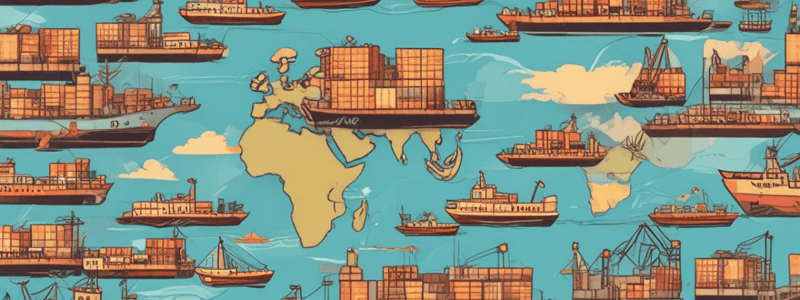Podcast
Questions and Answers
What is the primary goal of trade facilitation?
What is the primary goal of trade facilitation?
- To eliminate customs procedures and regulations
- To simplify and standardize customs procedures to facilitate the movement of goods across international borders (correct)
- To reduce economic competitiveness
- To increase trade costs and complexity
What is one of the key benefits of trade facilitation?
What is one of the key benefits of trade facilitation?
- Reduced economic growth and development
- Improved predictability and transparency (correct)
- Increased trade costs and complexity
- Reduced security and increased risks
What is the Revised Kyoto Convention (RKC)?
What is the Revised Kyoto Convention (RKC)?
- A methodology to measure customs efficiency
- A comprehensive framework for trade facilitation (correct)
- A framework for trade restriction
- A standardized data model for customs procedures
What is the primary role of the World Customs Organization (WCO) in trade facilitation?
What is the primary role of the World Customs Organization (WCO) in trade facilitation?
What is one of the key principles of trade facilitation?
What is one of the key principles of trade facilitation?
What is the WCO Data Model?
What is the WCO Data Model?
What is the Time Release Study (TRS)?
What is the Time Release Study (TRS)?
What is the WCO Mercator Programme?
What is the WCO Mercator Programme?
What is one of the benefits of simplifying and standardizing customs procedures?
What is one of the benefits of simplifying and standardizing customs procedures?
What is the ultimate goal of trade facilitation?
What is the ultimate goal of trade facilitation?
Flashcards are hidden until you start studying
Study Notes
Trade Facilitation
Definition: Trade Facilitation refers to the simplification and standardization of customs procedures to facilitate the movement of goods across international borders.
Importance:
- Reduces trade costs and increases efficiency
- Enhances predictability and transparency
- Boosts economic competitiveness
- Fosters economic growth and development
Key Principles:
- Transparency: Clear and accessible information on customs procedures and regulations
- Simplification: Streamlined and standardized customs procedures
- Standardization: Harmonization of customs procedures and documentation
- Cooperation: Collaboration between customs administrations and stakeholders
- Technology: Leveraging technology to facilitate trade
WCO's Role:
- Developed the Revised Kyoto Convention (RKC) to provide a framework for trade facilitation
- Provides technical assistance and capacity building to member countries
- Fosters cooperation and coordination among customs administrations and stakeholders
- Develops and promotes international standards and best practices
WCO Tools and Instruments:
- The Revised Kyoto Convention (RKC): A comprehensive framework for trade facilitation
- The WCO Data Model: A standardized data model for customs procedures
- The Time Release Study (TRS): A methodology to measure customs efficiency
- The WCO Mercator Programme: A capacity building program for trade facilitation
Benefits:
- Increased efficiency and reduced costs
- Improved predictability and transparency
- Enhanced competitiveness and economic growth
- Improved security and reduced risks
Trade Facilitation
Definition and Importance
- Trade Facilitation simplifies and standardizes customs procedures to facilitate the movement of goods across international borders
- Reduces trade costs and increases efficiency
- Enhances predictability and transparency
- Boosts economic competitiveness and fosters economic growth and development
Key Principles
- Transparency: clear and accessible information on customs procedures and regulations
- Simplification: streamlined and standardized customs procedures
- Standardization: harmonization of customs procedures and documentation
- Cooperation: collaboration between customs administrations and stakeholders
- Technology: leveraging technology to facilitate trade
World Customs Organization (WCO)
- Developed the Revised Kyoto Convention (RKC) as a framework for trade facilitation
- Provides technical assistance and capacity building to member countries
- Fosters cooperation and coordination among customs administrations and stakeholders
- Develops and promotes international standards and best practices for trade facilitation
WCO Tools and Instruments
- Revised Kyoto Convention (RKC): a comprehensive framework for trade facilitation
- WCO Data Model: a standardized data model for customs procedures
- Time Release Study (TRS): a methodology to measure customs efficiency
- WCO Mercator Programme: a capacity building program for trade facilitation
Benefits of Trade Facilitation
- Increased efficiency and reduced costs
- Improved predictability and transparency
- Enhanced competitiveness and economic growth
- Improved security and reduced risks
Studying That Suits You
Use AI to generate personalized quizzes and flashcards to suit your learning preferences.




